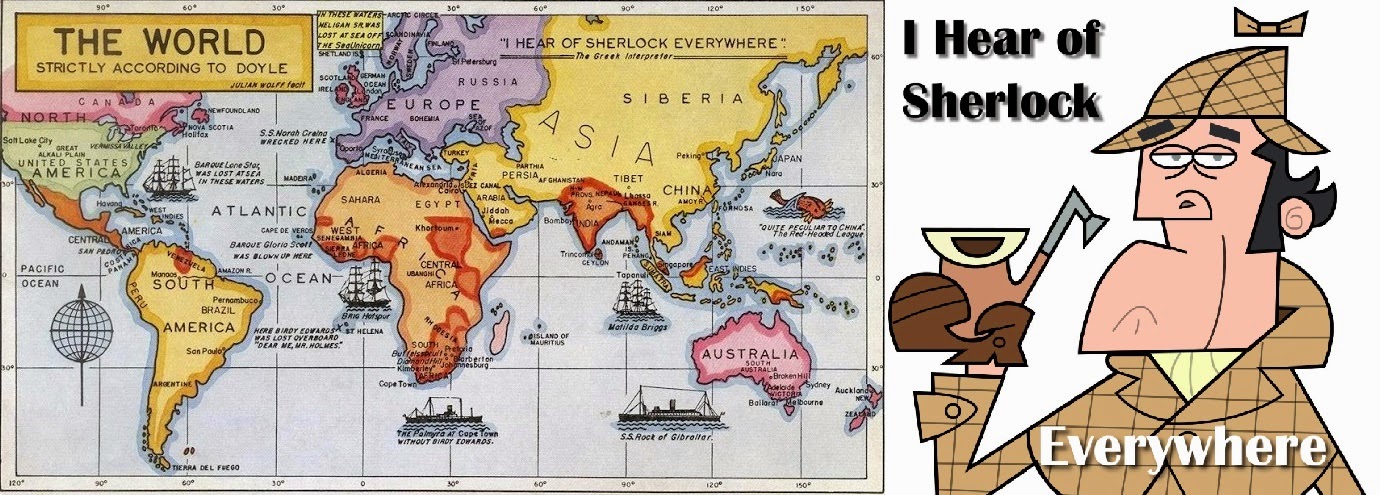"they are as sharp as needles, too" (STUD)
Even Sherlock Holmes was wrong once in a while, and clearly I was following in his erring footsteps when I suggested, in a March 18 posting here on I Hear of Sherlock Everywhere, that the annoying expression "Quick, Watson, the needle!" dates from the 1930s. As soon as my speculations appeared, Sherlockian scholars were whispering Norbury in my ear, sending awkward reminders that the phrase is known to have existed much earlier than that.
Ian Schoenherr, Ray Wilcockson, and Mattias Boström were all very helpful in this regard, pointing to needle references in such sources as the Commercial Telegraphers' Journal (July 1911) and — long before the Lilly Library became an important repository of Sherlockian material — the Indiana University yearbook for 1912.
@ianschoenherr @IHearofSherlock @darkgreendesk This is from DeWaal: pic.twitter.com/b2T2M3zJrG
— Mattias Boström, BSI (@mattias221b) March 18, 2015
@darkgreendesk @mattias221b This comes from The Packard, July 8, 1911 pic.twitter.com/lATasdO4XV
— Ian Schoenherr (@ianschoenherr) March 18, 2015
I learned with interest that cartoonist Tad Dorgan (TAD), whose "Daffydills" was a popular comic feature in the early years of the 20th century, used "Quick, Watson, the needle" often, as well as variations of it such as "Quick, Watson, the gun!" Dorgan, incidentally, is thought to be the originator of other immortal phrases such as "Yes, we have no bananas" and "See what the boys in the back room will have."
More embarrassingly, I learned that Dorgan's use of the phrase was no secret, as Julie McKuras of the Norwegian Explorers of Minnesota discussed it at length in the March 2011 issue of the newsletter published by the Friends of the Sherlock Holmes Collections at the University of Minnesota. The Minnesota collection includes Dorgan cartoons collected by the late John Bennett Shaw, as well as other early attestations. "The quotes are rampant in magazine articles dating from the period 1910 onward," McKuras writes. (Who knew? Plenty of people, apparently, but not me.)
But the phrase goes back even earlier — back, apparently, to the operetta "The Red Mill", first staged on Broadway in September 1906, with music by Victor Herbert and libretto by Henry Blossom. (It was loosely adapted for a 1927 film starring Marion Davies, whose brother-in-law George Regas played a minor role in the 1939 "Adventures of Sherlock Holmes" in which the Watsonian needle is also mentioned.)
Wouldn't you know, McKuras is aware of "The Red Mill" too. She reports that it
starred comedians Fred Stone and David Montgomery as two American vaudevillians. Stone and Montgomery were famous for their performances as the Scarecrow and Tin Man in the 1903 stage production of The Wizard of Oz."And she quotes an earlier critic:
Their roles in The Red Mill, as good-for-nothing con men and laze-abouts whose inner sense of entrepreneurship awakens when they are called upon to impersonate Sherlock Holmes and Dr. Watson, set the tone for one of the most popular character types of Broadway theater through the 1940s."
The Ohio Light Opera produced an album of the "Red Mill" music in 2001 — apparently on two LP records, which might indeed prompt an urgent call for a needle. Amazon currently stocks it.
That great Sherlockian Vincent Starrett said in 1932 that he had written to Fred Stone to ask about the origins of the jab about the needle. His letter mentioning that inquiry, addressed to Gray Chandler Briggs, is reproduced in "Dear Starrett —" "Dear Briggs —", edited by John Nieminski and Jon L. Lellenberg for the Baker Street Irregulars History Series (1989). But if Starrett ever received a reply from Stone, it is not known, at least not to me.
All this evidence seems to demolish my suggestion that "Quick, Watson, the needle" owes something to a commercial slogan popular in the 1940s, "Quick, Henry, the Flit!" Indeed, it begins to seem more likely that it was the other way round — that Watson and the needle were already firmly lodged in the public mind, and helped to make Henry and the Flit so successful.
"Watson," said he, "if it should ever strike you that I am getting a little over-confident in my powers, or giving less pains to a case than it deserves, kindly whisper `Norbury' in my ear, and I shall be infinitely obliged to you."
- "The Yellow Face"
--




0 comments:
Post a Comment